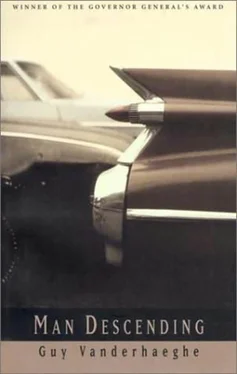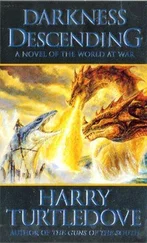In time everyone learned my father had lost his job for no good reason. And it wasn’t long before the kids of the fathers he had told his story to were following me down the street chanting, “No good reason. No good reason.” That’s how I learned my family was a topical joke that the town was enjoying with zest. I suppose my father found out too, because it was about that time he stopped going out of the house. He couldn’t fight back and neither could I. You never can.
After a while I didn’t leave the house unless I had to. I spent my days sitting in our screened verandah reading old copies of Saturday Evening Post and Maclean’s . I was content to do anything that helped me forget the heat and the monotony, the shame and the fear, of that longest of summers. I was thirteen then and in a hurry to grow up, to press time into yielding the bounty I was sure it had in keeping for me. So I was killing time minute by minute with those magazines. I was to enter high school that fall and that seemed a prelude to adulthood and independence. My father’s misfortunes couldn’t fool me into believing that maturity didn’t mean the strength to plunder at will. So when I found an old Latin grammar of my mother’s I began to read that too. After all, Latin was the arcane language of the professions, of lawyers and doctors, those divinities owed immediate and unquestioning respect. I decided I would become either one, because respect could never be stolen from them as it had been from my father.
That August was the hottest I can remember. The dry heat made my nose bleed at night, and I often woke to find my pillow stiff with blood. The leaves of the elm tree in the front yard hung straight down on their stems; flies buzzed heavily, their bodies tip-tapping lazily against the screens, and people passing the house moved so languidly they seemed to be walking in water. My father, who had always been careful about his appearance, began to come down for breakfast barefoot, wearing only a vest undershirt and an old pair of pants. He rarely spoke, but carefully picked his way through his meal as if it were a dangerous obstacle course, only pausing to rub his nose thoughtfully. I noticed that he had begun to smell.
One morning he looked up at me, laid his fork carefully down beside his plate and said, “I’ll summons him.”
“Who?”
“Who do you think?” he said scornfully. “The bastard who fired me. He had no business calling me Dutchie. That’s slander.”
“You can’t summons him.”
“I can,” he said emphatically. “I’m a citizen. I’ve got rights. I’ll go to law. He spoiled my good name.”
“That’s not slander.”
“It is.”
“No it isn’t.”
“I’ll sue the bastard,” he said vaguely, looking around to appeal to my mother, who had left the room. He got up from the table and went to the doorway. “Edith,” he called, “tell your son I’ve got the right to summons that bastard.”
Her voice came back faint and timid, “I don’t know, George.”
He looked back at me. “You’re in the same boat, sonny. And taking sides with them don’t save you. When we drown we all drown together.”
“I’m not taking sides,” I said indignantly. “Nobody’s taking sides. It’s facts. Can’t you see…,” but I didn’t get a chance to finish. He left, walked out on me. I could hear his steps on the stairway, tired, heavy steps. There was so much I wanted to say. I wanted to make it plain that being on his side meant saving him from making a fool of himself again. I wanted him to know he could never win that way. I wanted him to win, not lose. He was my father. But he went up those steps, one at a time, and I heard his foot fall distinctly, every time. Beaten before he started, he crawled back into bed. My mother went up to him several times that day, to see if he was sick, to attempt to gouge him out of that room, but she couldn’t. It was only later that afternoon, when I was reading in the verandah, that he suddenly appeared again, wearing only a pair of undershorts. His body shone dully with sweat, his skin looked grey and soiled.
“They’re watching us,” he said, staring past me at an empty car parked in the bright street.
Frightened, I closed my book and asked who was watching us.
“The relief people,” he said tiredly. “They think I’ve got money hidden somewhere. They’re watching me, trying to catch me with it. The joke’s on them. I got no money.” He made a quick, furtive gesture that drew attention to his almost naked body, as if it were proof of his poverty.
“Nobody is watching us. That car’s empty.”
“Don’t take sides with them,” he said, staring through the screen. I thought someone from one of the houses across the street might see him like that, practically naked.
“The neighbours’ll see,” I said, turning my head to avoid looking at him.
“See what?” he asked, surprised.
“You standing like that. Naked almost.”
“There’s nothing they can do. A man’s home is his castle. That’s what the English say, isn’t it?”
And he went away laughing.
Going down the hallway, drawing close to his door that always stood ajar, what did I hope? To see him dressed, his trousers rolled up to mid-calf to avoid smudging his cuffs, whistling under his breath, shining his shoes? Everything as it was before? Yes. I hoped that. If I had been younger then and still believed that frogs were turned into princes with a kiss, I might even have believed it could happen. But I didn’t believe. I only hoped. Every time I approached his door (and that was many times a day, too many), I felt the queasy excitement of hope.
It was always the same. I would look in and see him lying on the tufted pink bedspread, naked or nearly so, gasping for breath in the heat. And I always thought of a whale stranded on a beach because he was such a big man. He claimed he slept all day because of the heat, but he only pretended to. He could feel me watching him and his eyes would open. He would tell me to go away, or bring him a glass of water; or, because his paranoia was growing more marked, ask me to see if they were still in the street. I would go to the window and tell him, yes, they were. Nothing else satisfied him. If I said they weren’t, his jaw would shift from side to side unsteadily and his eyes would prick with tears. Then he imagined more subtle and intricate conspiracies.
I would ask him how he felt.
“Hot,” he’d say, “I’m always hot. Can’t hardly breathe. Damn country,” and turn on his side away from me.
My mother was worried about money. There was none left. She asked me what to do. She believed women shouldn’t make decisions.
“You’ll have to go to the town office and apply for relief,” I told her.
“No, no,” she’d say, shaking her head. “I couldn’t go behind his back. I couldn’t do that. He’ll go himself when he feels better. He’ll snap out of it. It takes a little time.”
In the evening my father would finally dress and come downstairs and eat something. When it got dark he’d go out into the yard and sit on the swing he’d hung from a limb of our Manitoba maple years before, when I was a little boy. My mother and I would sit and watch him from the verandah. I felt obligated to sit with her. Every night as he settled himself onto the swing she would say the same thing. “He’s too big. It’ll never hold him. He’ll break his back.” But the swing held him up and the darkness hid him from the eyes of his enemies, and I like to think that made him happy, for a time.
He’d light a cigarette before he began to swing, and then we’d watch its glowing tip move back and forth in the darkness like a beacon. He’d flick it away when it was smoked, burning a red arc in the night, showering sparks briefly, like a comet. And then he’d light another and another, and we’d watch them glow and swing in the night.
Читать дальше












